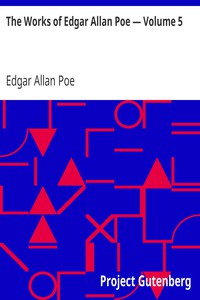The Works of Edgar Allan Poe — Volume 5 by Edgar Allan Poe (book reader for pc .txt) 📕

Excerpt from the book:
Read free book «The Works of Edgar Allan Poe — Volume 5 by Edgar Allan Poe (book reader for pc .txt) 📕» - read online or download for free at americanlibrarybooks.com
Download in Format:
- Author: Edgar Allan Poe
Read book online «The Works of Edgar Allan Poe — Volume 5 by Edgar Allan Poe (book reader for pc .txt) 📕». Author - Edgar Allan Poe
down to the flower, And dances again In the rhythm of the shower— **The murmur that springs From the growing of grass * The Albatross is said to sleep on the wing. ** I met with this idea in an old English tale, which I am now unable to obtain and quote from memory:—“The verie essence and, as it were, springe-heade, and origine of all musiche is the verie pleasaunte sounde which the trees of the forest do make when they growe.” Are the music of things— But are modell’d, alas!— Away, then my dearest, O! hie thee away To springs that lie clearest Beneath the moon-ray— To lone lake that smiles, In its dream of deep rest, At the many star-isles That enjewel its breast— Where wild flowers, creeping, Have mingled their shade, On its margin is sleeping Full many a maid— Some have left the cool glade, and * Have slept with the bee— Arouse them my maiden, On moorland and lea— Go! breathe on their slumber, All softly in ear, The musical number They slumber’d to hear— For what can awaken An angel so soon * The wild bee will not sleep in the shade if there be moonlight. The rhyme in this verse, as in one about sixty lines before, has an appearance of affectation. It is, however, imitated from Sir W. Scott, or rather from Claud Halcro—in whose mouth I admired its effect: O! were there an island, Tho’ ever so wild Where woman might smile, and No man be beguil’d, &c. Whose sleep hath been taken Beneath the cold moon, As the spell which no slumber Of witchery may test, The rythmical number Which lull’d him to rest?” Spirits in wing, and angels to the view, A thousand seraphs burst th’ Empyrean thro’, Young dreams still hovering on their drowsy flight— Seraphs in all but “Knowledge,” the keen light That fell, refracted, thro’ thy bounds, afar O Death! from eye of God upon that star: Sweet was that error—sweeter still that death— Sweet was that error—ev’n with us the breath Of science dims the mirror of our joy— To them ’twere the Simoom, and would destroy— For what (to them) availeth it to know That Truth is Falsehood—or that Bliss is Woe? Sweet was their death—with them to die was rife With the last ecstacy of satiate life— Beyond that death no immortality— But sleep that pondereth and is not “to be”— And there—oh! may my weary spirit dwell— *Apart from Heaven’s Eternity—and yet how far from Hell! * With the Arabians there is a medium between Heaven and Hell, where men suffer no punishment, but yet do not attain that tranquil and even happiness which they suppose to be characteristic of heavenly enjoyment. Un no rompido sueno— Un dia puro—allegre—libre Quiera— Libre de amor—de zelo— De odio—de esperanza—de rezelo.—Luis Ponce de Leon. Sorrow is not excluded from “Al Aaraaf,” but it is that sorrow which the living love to cherish for the dead, and which, in some minds, resembles the delirium of opium. The passionate excitement of Love and the buoyancy of spirit attendant upon intoxication are its less holy pleasures— the price of which, to those souls who make choice of “Al Aaraaf” as their residence after life, is final death and annihilation. What guilty spirit, in what shrubbery dim, Heard not the stirring summons of that hymn? But two: they fell: for Heaven no grace imparts To those who hear not for their beating hearts. A maiden-angel and her seraph-lover— O! where (and ye may seek the wide skies over) Was Love, the blind, near sober Duty known? *Unguided Love hath fallen—‘mid “tears of perfect moan.” He was a goodly spirit—he who fell: A wanderer by moss-y-mantled well— A gazer on the lights that shine above— A dreamer in the moonbeam by his love: What wonder? For each star is eye-like there, And looks so sweetly down on Beauty’s hair— And they, and ev’ry mossy spring were holy To his love-haunted heart and melancholy. The night had found (to him a night of wo) Upon a mountain crag, young Angelo— Beetling it bends athwart the solemn sky, And scowls on starry worlds that down beneath it lie. Here sate he with his love—his dark eye bent With eagle gaze along the firmament: Now turn’d it upon her—but ever then It trembled to the orb of EARTH again. “Iante, dearest, see! how dim that ray! How lovely ’tis to look so far away! * There be tears of perfect moan Wept for thee in Helicon.—Milton. She seem’d not thus upon that autumn eve I left her gorgeous halls—nor mourn’d to leave. That eve—that eve—I should remember well— The sun-ray dropp’d, in Lemnos, with a spell On th’Arabesque carving of a gilded hall Wherein I sate, and on the draperied wall— And on my eye-lids—O the heavy light! How drowsily it weigh’d them into night! On flowers, before, and mist, and love they ran With Persian Saadi in his Gulistan: But O that light!—I slumber’d—Death, the while, Stole o’er my senses in that lovely isle So softly that no single silken hair Awoke that slept—or knew that it was there.
Free e-book: «The Works of Edgar Allan Poe — Volume 5 by Edgar Allan Poe (book reader for pc .txt) 📕» - read online now on website american library books (americanlibrarybooks.com)
Similar e-books:





Comments (0)